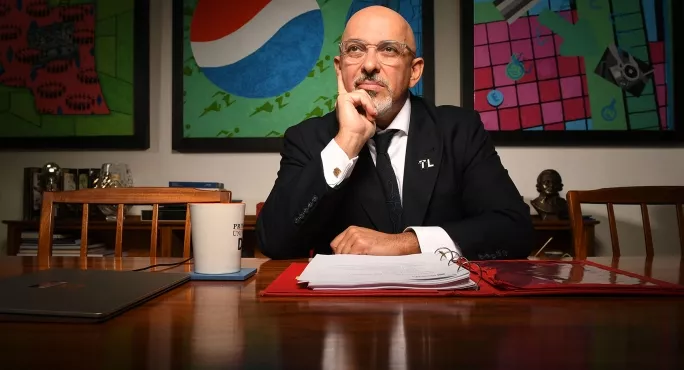Zahawi: No new regulation ‘burden’ on MATs

Nadhim Zahawi has told school leaders that new regulations for multi-academy trusts will not restrict their freedoms.
The education secretary has admitted that there have been concerns about the scope of the government’s plans to hold multi-academy trusts to account through its new Schools Bill.
Mr Zahawi told the Confederation of School Trusts’ annual conference today that the government plans to create a baseline of required standards that MATs will be expected to meet to prevent the reputation of the sector being damaged by failing trusts.
However, he told academy leaders that he did not want to restrict academy freedoms or interfere with how school trusts are run.
- More on the education secretary: Nadhim Zahawi on what he will do next
- Academies: Heads warn of lack of clarity on whether schools will be forced to join MATs
- MAT expansion: Allowing councils to establish MATs ‘will lead to rapid academy growth’
Mr Zahawi said: “This is not about the Department for Education telling you how to run your trusts.
“I believe - this government believes - that you know best how to deliver excellence. It is not something that can be achieved by a list of standards or a piece of regulation.
“There has been some concern about the scope of our Bill, especially with regard to academy trusts.”
Zahawi ‘doesn’t want to restrict’ multi-academy trusts
Mr Zahawi said these concerns centred on Clause 1 of the Schools Bill and “the possible centralisation of power over academies”.
He added: “I hear those concerns. So let me say again, I will not impose any new burdens that would restrict the very freedoms that enable you to be such a success.
“I’m here to listen to you. I want to get this right. We need to get this right.”
On the need for a baseline of requirements for MATs to meet, Mr Zahawi said: “The reality is - and the Confederation of School Trusts has rightly raised this concern before - that we don’t want those who are failing to damage the excellent reputation that you have all worked so hard to build.”
During a question and answer session with Mr Zahawi after his speech, CST chief executive Leora Cruddas said that sector leaders remain concerned about part one of the Schools Bill.
Mr Zahawi responded: “The bill is in the House of Lords. It’s undergoing detailed scrutiny, which I think is helpful.
“I just want to land this with you. I repeat again: I have no intention of interfering with how trusts are run.”
Tom Campbell, interim CEO of E-ACT academy trust, welcomed Mr Zahawi’s efforts to show that leaders’ concerns were being heard, but warned that the new legislation still “risks weakening” academies.
“While it is encouraging that the secretary of state recognised the concerns that many of us have about the Schools Bill as currently drafted, overall the bill still risks weakening rather than strengthening academy trusts. It’s also concerning that a consultation on regulation comes after the bill, and raises questions about the sequencing and whether this is a genuine consultation,” he said.
Another leading multi-academy trust leader at the CST conference, who asked to remain anonymous, said that there were concerns not just around whether Mr Zahawi would impose restrictions on MATs but around whether the Schools Bill left it open for future education ministers to do so.
This first part of the Schools Bill sets out standards which the education secretary may require MATs to meet as part of the new regulations.
It lists 20 examples of where standards might be set including the nature and quality of education provided, and the curriculum followed; the length of the school day; the renumeration of staff; and governance arrangements.
DfE accused of ‘micromanaging’
Shadow schools minister Stephen Morgan used his speech at the same event to accuse the government of attempting to “micromanage” schools through the new legislation.
In his speech at the CST conference, he said: “I’ve no doubt that - like me - you will have concerns about the sweeping powers the bill proposes for the secretary of state.
“Powers to set the length of your school day. Powers around the exams children are entered for. Powers to say not just what you teach children, but how you teach them.”
Mr Morgan told MAT leaders that these new planned standards seemed to “run counter to the very notion of independence and innovation ministers tell us academies should have”.
The Labour MP added: “This government is very fond of trusts but it should cut both ways. A Labour government would trust school staff to get on with their jobs as educators. There has been too much needless micromanaging of the sector from Whitehall in recent years.”
You need a Tes subscription to read this article
Subscribe now to read this article and get other subscriber-only content:
- Unlimited access to all Tes magazine content
- Exclusive subscriber-only stories
- Award-winning email newsletters
Already a subscriber? Log in
You need a subscription to read this article
Subscribe now to read this article and get other subscriber-only content, including:
- Unlimited access to all Tes magazine content
- Exclusive subscriber-only stories
- Award-winning email newsletters
topics in this article



